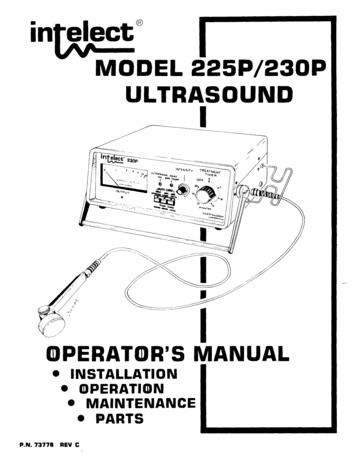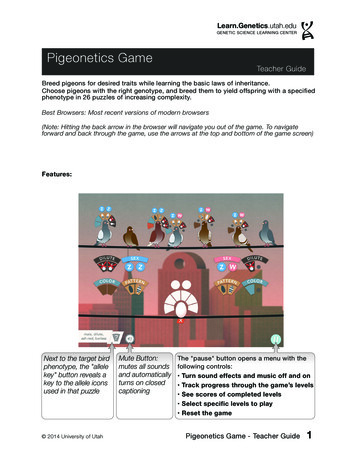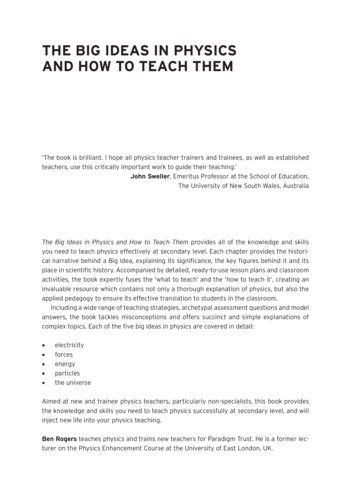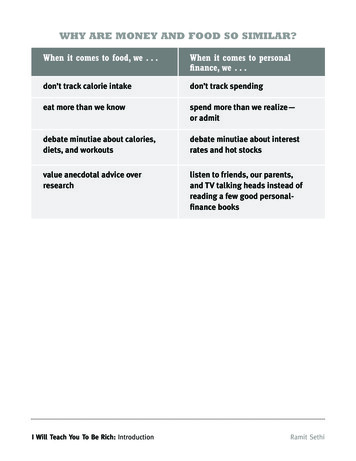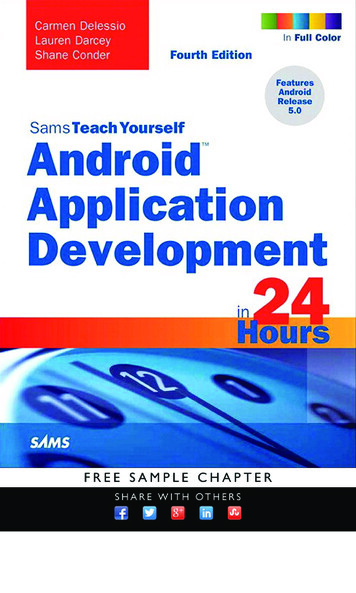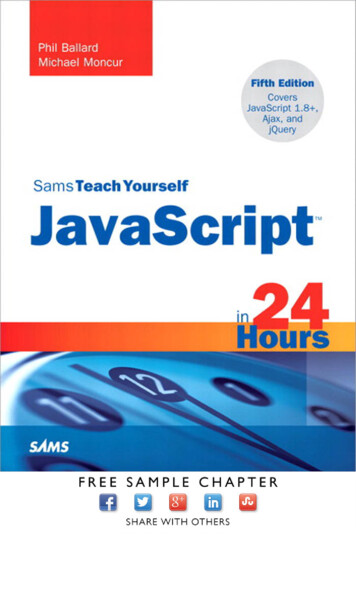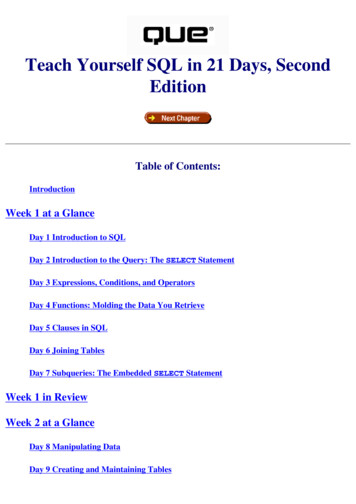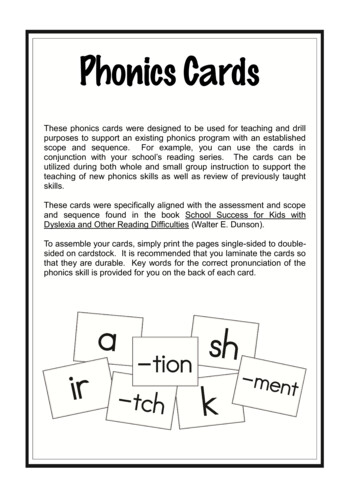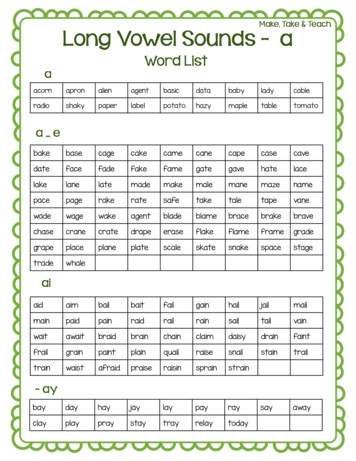
Transcription
In Service Teacher Education Manualfor Teachers and Teacher Educators in Commerce(higher secondary stage)
Development T eamDr. Minoo NandrajogAssociate Professor (Commerce)DESSH, NCERTProf. D K VaidHead, DES&DPNCERTDr. Harjeet KaurAssociate ProfessorDepartment of EducationJamia Millia IslamiaNew DelhiMr. Shruti Bodh AggarwalVice PrincipalRajkiya Pratibha Vikas VidyalayaKishanganj, DelhiMr. Shruti Bodh AggarwalVice PrincipalRajkiya Pratibha Vikas VidyalayaKishanganj, DelhiMs. Sashi KalaPGT CommerceMount Carmel SchoolAnand Niketan, New DelhiDr. Seema SrivastavaLecturer, DIET, Moti BaghSCERT, New DelhiMs. Inderjeet KaurPGT CommerceDelhi Public SchoolMathura Road, New Delhi
CONTENTSIntroductionSECTION IChapter 1Organization of In-service Training1Chapter 2Teacher Training Outcome11Chapter 1Commerce Education16Chapter 2Teaching Learning Strategies29SECTION IIChapter 33A3B3C3D3E3F3GTransaction of Themes53Mining Industry and EnvironmentPrinciples of ManagementBusiness EnvironmentGlobalization and Business EnvironmentFinancial SystemMarketingConsumer Protection54568996105117128Chapter 4Evaluation in Business Studies145Chapter 5Enabling Environment201
IntroductionManual – What is it and How is it UsefulA manual is a tool used to gather information how to use a particular device.Thus we have a manual with every pack of devices such as computer, refrigeratorand other machines which we buy for our everyday use. In the parlance of business studies especially in the present context it is a store of literature which willhelp the teachers of business studies to make their curriculum transaction practices more innovative and useful for pupils. It will reflect on some suggestionswhich the teachers can use to make teaching learning process more studentscentered.It would therefore focus on areas such as making best use of the time tocreate interest in the subject. As you will find it contains an article on curriculumtransaction of unit 2- Principles of management which has 14 mini lesson planswhich suggest practical ways of transacting the curriculum in modern way usinginternet and question answer method. This is typically different from thetradition Herbatian lesson plan taught in most B .Ed courses. This lesson hasbeen allotted 14 periods and hence 14 lesson plans.The manual contains resources for teachers to refresh their knowledge abouttechnicalities of the subject. Thus enrichment articles such as ‘Evaluation inBusiness studies’ touch upon types of evaluation both formative and summativewhich are very much now part of the reforms being carried out by the CBSE. Thisprocess is likely to be extended to senior secondary classes. The teachers ofbusiness studies have to make very innovative choices to fulfill the objectives ofCCE system. This article should help them in such an effort.A need has been felt that Business Studies must become more interesting forthe students so that they feel inclined to take the subject seriously for betterlearning and application. Case studies have been included in the book for thispurpose. But due to inflexibilities of the examination system these case studiesare not used in the class. For the first time case problems are also included in thebook. The teachers should use them for better curriculum transaction. The manualshould provide some insight to the teachers to use the case studies and caseproblems in class. Case studies of Telecom Sector and Business Environment,Mining and Business Environment, Tata’s Nano can have been discussed.In the present manual some enrichment material has also been included onsome topics like ‘Business Environment’ and Financial System. This type of material should encourage teachers to go beyond textbook to supplement the textualmaterial. This should make the teaching learning of Business Studies more interesting and lively for students.It is expected that the manual would be useful for teachers. Any suggestionfor improvement is always welcome.
Section ICHAPTER 1ORGANISATION OF IN-SERVICE TRAININGOF TEACHERSNeed and ImportanceThe destiny of a country is shaped in its classrooms. Teachers play a pivotal rolein this activity. Therefore they must keep abreast the latest methods of curriculumtransactions in class. Accordingly teachers training during service are requiredfor the following reasons:a.To keep abreast with the latest happenings in recent past.b.To help teachers recognize the individual differences in children and modifythe method of teaching accordingly.c.To remove any deficiencies in knowledge of subject content and alsoenrichment thereof.d.To recognize and master the use of teaching aids like computers and internetincluding PowerPoint Presentations to make the teaching learning processmore lively and useful.e.To incorporate constructivist approach to teaching learning process as perconcerns of National Curriculum Framework, 2005.f.Using technology to enhance the learning process.Need for Inservice Teachers Training for Teachers of AccountancyThe curriculum of accountancy for senior secondary level has undergonesubstantial change in the last few years. Some of the changes and also need forin-service training is given below:a.Computerized Accounting has been introduced in class XI as compulsorypart of the course and optional part in class XII. It involves the use of MSACCESS in which relational accounting database has to be set up. This partis not taught thoroughly by the teachers as they are not fully conversant withcomputers. Accordingly both theoretical and practical training should beimparted to teachers in this area so that the students do not suffer.b.Accountancy Practical has been introduced as compulsory part of course inclass XII. It involves the examination in the topics of ratio analysis and cashflow statement based on annual report of companies. But the teachers are
not fully conversant with using the annual report of companies. Consequentlytraining should be imparted in this area so that the pedagogical objectivesare met and we impart some useful employability skills to students.c.Some new developments have taken place recently like passing of a bill on‘LIMITED LIABILITY PAR TNERSHIP’ and a draft ‘COMPANIES BILL, 2008’.The teachers should be informed in detail in this regard so that our curriculumis updated for the benefit of the students.d.Some topics of the syllabus like ‘SHARE CAPITAL’ is still imparting old conceptslike Share Application, Share Allotment, and calls etc. Latest methods like‘Book Building Process’ of capital issues etc should be incorporated and taughtso that the students are not lagging behind. The curriculum can be modifiedonly with support of teachers. Accordingly the teachers should train in thisfield of curriculum in advance so that it is acceptable.e.There is a demand from teachers that practical aspects like TALLY etc shouldbe introduced to increase employability skills of pupils. All this requires inservice training.f.Every year teachers have certain difficulties regarding syllabus which hassome changes and also some topics which are not clear. In-service trainingprovides an opportunity for removal of such difficulties.g.In-service training also provides teachers an opportunity to meet peers andexchange ideas on better curriculum transaction.Need for Inservice Training for Teachers of Business StudiesOver the years curriculum of business studies has also changed and new methodsof curriculum transaction are being introduced. This necessitates need for inservice training due to the following reasons:a.In the new book of business studies for class XII, case problems have beenintroduced. While on the one hand it has necessitated the need for using boxitems in the NCER T book as teaching aids and on the other hand it is inconsonance with constructivist approach of the NCF, 2005.b.In continuation of point no.1 it is to be noted that CBSE has earmarked 20%weight age to application oriented questions which can include questionsfrom case studies, case problems, box items, pictures and cartoons from theNCER T book. But adequate training in this aspect has not been given toteachers. Accordingly these reforms although beneficial for the attainment ofeducational objectives have not found favour with the teachers. Thereforeadequate training should be imparted in this aspect of curriculum change.c.Teaching of business studies has followed very bookish approach and theother methods such as class discussions, group problem solving and use ofoutside material like business magazines and periodicals have not caught
attention of the teachers. In the context of globalization of our businessenvironment where knowledge is power such modern methods should beused in our class rooms. For this the required training should be given to theteachers.d.In the schools the CBSE has introduced language labs, social science labsand mathematics labs. All these subjects have practical work in them. Inbusiness studies and accountancy also there is practical work. So a demandit being made for introducing commerce laboratory in schools. The teachersshould be trained in this aspect to make the change meaningful and useful.e.There are some changes in the curriculum like in class XII the unit on businessenvironment has been included in the syllabus for 2010 board examinationof CBSE whereas it was excluded earlier. The teachers need training in howto use this unit in other parts of the syllabus productively. Many such aspectsof the curriculum like methods of control, financial markets and marketingetc require reinforcement.Training Need AnalysisAn in-service teacher training programme can be successful only if it results inteacher gaining some knowledge or skill which will increase the effectiveness ofthe curriculum transaction process in the classroom. Therefore to make the trainingprogramme effective need analysis of the teachers is very important.There are many methods of finding out the needs which must be fulfilled bythe training programme. Some of these can be:a.Questionnaire: A well designed questionnaire filled by the teacher duringseminars and workshops can help to find out areas which the teacher feelsare important for training. This questionnaire can be utilized by teachertraining institutions such as NCER T, SCER T AND DIET’S for designing atraining programme.b.Student feedback: Students are the real consumers of teaching services.Therefore it would be very useful if their opinion is sought as to where theteacher is lacking. Unfortunately this method is not taken very seriously inIndia. For example in business study class a student might ask a question ona subject out of the course but very much related to the curriculum. In sucha situation a teacher might feel that he/she requires in-service training. Onesuch topic is computerized accounting which is taught as a compulsory partin class XI and optional part of class XII curriculum.c.Classroom observation: Educational experts can observe the teacher duringinspections and also otherwise to find out the deficiencies which can beremoved due to training.d.Drawing conclusions during evaluation process: - When evaluation processof students is underway their deficiencies can be found out and an in-service
training programme can be designed to remove them in the teaching learningprocess. For example lately CBSE has introduced HOTS questions and theteachers are not adequately trained to handle them and also inculcate skillswhich the students need to answer those questions.e.Feedback from school administrators and parents: - Sometimes the schoolprincipals and vice principals can help to find out any deficiencies whichought to be removed. Parents who observe their child more than the teachercan also chip in with their comments and suggestions.Some Emerging Needs for Training in General and for Commerce Teacherin Particulara.Changing expectations of society: - The role of education is changing veryrapidly due to changes in society. Education is in great demand and technologyis changing and so is curriculum. So the teacher who is regularly updatedabout all these things is only successful. Accordingly in-service training is tobe imparted to him/her. Talking about commerce teacher the subject is semivocational and therefore there is a pressing need to update knowledge of theteacher in many areas like changes in business environment etc.b.Use of information and communication technology: The use of ICT and internetin particular has opened new vistas for making education process effective.As such all teachers including commerce teacher has to learn how to use itfor making his lesson delivery good and efficient. For example althoughcomputerized accounting has been introduced long back but still the commerceteacher is not equipped to teach this subject effectively and practically. Hencetraining is required in this area.c.Increasing competition: A student has to face a lot of competition in everywalk of life. The process of education should empower the child to emergevictorious in this battle. Accordingly the curriculum is changing and evenareas such as life skill education are being inculcated. For a commerce teacherthis is more relevant because business gives maximum employment to youthand accordingly the commerce teacher should be trained to impart latest andmodern skills to children.d.Employability skills: Related to life skills are employability skills which includedecision making, empathy and sociability etc. These are being integrated intothe curriculum in the form of case studies and applied questions. Every teacherin general and commerce teacher in particular needs to be empowered inthese areas.e.Group work cooperation: Modern curriculum transaction techniquesemphasise group work among students as a method of attaining learningobjectives effectively. The teachers need to be trained to use it with ease andconfidence.
Some Specific Areas Where Commerce Teachers Require in Service TrainingCommerce
for Teach ers and Teacher Educato rs in Co mm erce (higher secondary stage ) Development T eam Dr. M ino o Nandra jog Asso ciate Pr ofe sso r (C omm erce) DE SS H, NCERT Prof. D K Vaid Hea d, DE S&DP NCERT Dr. Har jee t Kaur .
